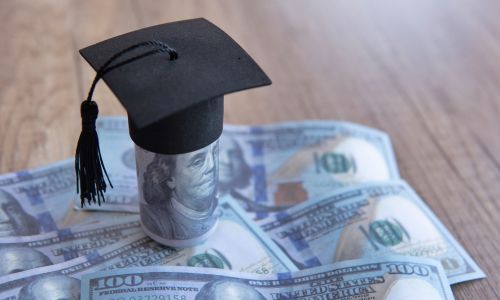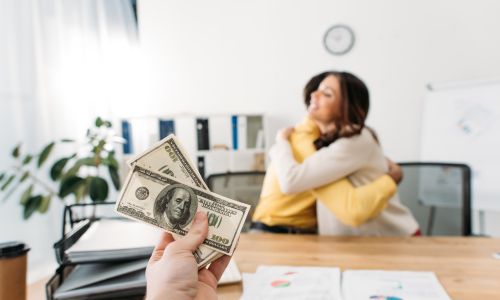Key Takeaways
- Loan taken for educational purposes is student debt.
- Found Money is legally and officially your money.
- Unpaid student debt could make you a defaulter.
- Budget your expenses to pay off student debt.
College days are special for everyone. And no matter how much we try, we can never bring those days back. But there is one blast from the past that stays with us for quite some time. And that is the student loan that we take for college. Again, college doesn’t come with the guarantee of getting you a high-paying job. The amount of the loan further affects your finances. And then you are left with the question of how to pay off student loans with no money. And it can seem like an impossible task but we are here to help you sail through it.
What Amounts As Student Loan Debt?
The amount that you took as a loan for your educational expenses turns into student debt when you owe it. Anyone can get a student loan either through government or private sources like lenders, banks, etc. The conditions of repayment differ according to the lender. Some might want them to be paid simultaneously with the student’s college, while others would allow for the repayment to start after graduation. The interest accumulated would also depend on the conditions as agreed upon with the lender.
Should You Pay Off Student Loan Debt Early?

The correct answer to this question will depend on your financial situation. If you have enough savings, an emergency fund or some investments in place, it would be a good idea to pay off your student debt as early as possible. Because the interest accumulated on student debt will increase as long you will take to pay off the debt. Further, if you are not in a very comfortable position regarding your finances, paying off student debt still would be necessary, although by taking your time, if not early.
Consequences Of Not Paying Off Debt
Sometimes, when financial times are bad, you should think about defaulting. Not because you intend to but because that is the only solution left. But there are consequences of not paying off your student debt. These are:
- You will be counted as a defaulter; your account will be considered as defaulted. This will affect your credit score in the worst way possible.
- When you default, your payment becomes due immediately, and you can no longer have deferment or forbearance.
- Some of your federal benefit payments and tax refunds may be set off.
- Depending on the lender, they may also take you to the court.
- Lenders can also sell off your debt account to a debt-collecting agency and might officially pressure you to pay off the debt.

How To Pay Off Student Loans With No Money?
Your finances might not always keep you in the best of financial condition, and when you take into consideration your student loans, amongst other expenses, you realize that you don’t have enough to pay them off. However, it is still possible to pay off student loans with no money or little money. Here’s how:
1. No New Debts
If you are finding it difficult to pay off your previous student loans, you are fidgeting with the idea of taking on new debts to pay off the previous ones, but this might not be as promising as it sounds. It would help if you stopped taking new debts be it in the form of secured or even credit cards. It might mess up your finances even more if not done right.
2. Stay Informed

You must be aware of all the student loans that you owe and even the amount in each one of them. This is to help you decide how to budget your finances, how much in total you need to repay etc. The sooner you are aware of all the repayments you need to make, the sooner you will be able to take charge of your finances.
3. Budgeting
It would help if you started budgeting. You must create a budget that will help you decide what amount goes for necessities and what amount goes for debt repayment. You will also be able to cut down some of the wasteful expenses and thus help you repay your student loans. You can keep track of your income and expenses and, hence, spend it wisely.
4. Earn More

If you believe you don’t have enough money as of now even if you have a stable and regular job, you should take a side job. This side hustle could help you earn more and pay off your student debt. You can put this extra income in your budget in a way that all your income from the side job would go to debt repayment. You can take a weekend job like dog walking or even look for some remote work on sites like ZipRecruiter.
5. Grace Period

Generally, student loans come with a grace period. Which is the period just after your graduation and where you don’t have to pay the debt. The grace period differs from lender to lender. But the federal student loans generally have a six-month grace period right after your graduation. You must stay informed that in private and unsubsidized federal loans, the interest is still charged on the debt while in the grace period.
You can start right here by making even just the payments for the interest that is being incurred. This way you would be in a slightly better position when your grace period ends.
6. Automation
If you have more than one student loan you might be confused with paying the installments every month for them. It has to be a task to remember installments along with paying your regular bills. Therefore, you can automate your payments. You can use apps or tools like Bill Trim, which can pay your bills for you and even negotiate for lowering your bills, thus saving you money in the process.
When you pay on time, you can escape from extra or late fees. Further, some loan providers also offer discounts when you set up automatic payments. You can take advantage of that as well.
7. Alternative Repayments
You can search for other repayment ways. If you have a federal loan there is a chance that you would be able to have an alternative repayment plan that works for you. It would help if you kept in mind that when the time of repayment increases, so does the interest that you would be paying. Because none of these plans decreases or stops interest. These plans are obtainable only on federal loans and not on private loans.
(i) Extended Repayments:
This plan allows you to stretch the period of payment of the loan. If you were to repay the loan in 10 years, it could now be stretched to 25 years. Thus lowering monthly payments for your financial situation.
(ii) Graduated Repayments:

This plan allows you to pay less in installments when you have just graduated, considering your entry-level jobs. Under this plan, the payments made every month go up after every two years for the entire repayment period. This plan thus assumes that you will progress financially as years progress.
(iii) PAYE:
This repayment plan stands for pay as you earn. This plan allows you to pay only 10% of your current income for the next twenty years. But this comes with the condition that you prove your financial problems. Once you qualify, which might seem difficult to prove, but then you can continue to pay under this plan even after you are doing well with finances.
(iv) ICR:
This repayment plan stands for Income contingent repayment. This plan calculates payments on the basis of adjusted gross income that you could make every month for the next 25 years, which isn’t more than 20 % of your income. And when the term of 25 years ends, and if there is still some balance debt left, that balance is waived off.

We empower you to save for Student Loan Repayment.
8. Loan Consolidation
If you had to take loans for more than one semester, there are chances that you have multiple loans, multiple lenders and hence multiple checks every month to be paid. And these might be unaffordable for you. You can consolidate your loans. You can apply for a Direct Consolidation Loan. You can consolidate all your student loans into one and this could even be at a lower interest rate.
You can even stretch your repayment period up to 30 years and hence pay a lesser amount each month. And the good thing is it is fixed rates. This direct consolidation loan can happen for federal loans and not private ones.
9. Loan Deferment
You can ask your lender to defer your payments for the loan. You ask for this if you are unemployed for the time being. If your student loan comes under a federal loan and you qualify for the loan deferment for a specific period, it will depend on the loan type if they charge you interest for the deferment period or not. If you have a private loan and the lender doesn’t agree to loan deferment, you can try for loan forbearance.
10. Loan Forbearance
If you opt for loan forbearance and if you get permission from your lender, you can stop making payments to your debts for a specific period. You may also receive permission for reduced monthly payments temporarily. You must know that even in forbearance, the interest will continue to accumulate. This is simpler to get loan forbearance than deferment. Forbearance is extended or granted for a year at one time.
11. Found Money
This is the money that is legally and officially yours but either you don’t know or haven’t yet claimed. This money can be from government agencies, your old bank account, previous employers or some insurance policies. There are government websites where you can look for found money. If you have changed places and are in different states, you must look for money in each of those states, neglecting the time you were in a particular state.
12. Windfalls
This refers to unexpected or unknown cash that you could get. This could be anything from tax refunds to work bonuses to inheritances. Any amount of money at any time that you were not expecting is a windfall for you, and you could easily divert it toward student loan debt repayment.
13. Refinancing
This means you can refinance your high-interest loans for a loan from a lender that offers lower interest rates. Refinancing helps you to save money in the long run. But there is one problem with refinancing. That is, if you have a federal loan, refinancing would make a private loan, and you could be prone to lose benefits like income-driven repayment plans or any other that come with federal loans. But if you have a mix of private and federal loans you can refinance private loans.
14. Loan Forgiveness

If you have pursued careers in public service you could get student debt relief. When you work in public service institutions or jobs, you pay a particular number of installments and then the rest of the balance debt is forgiven. Further, governments, from time to time, bring in the student debt waving-off scheme. You can keep an eye out for those too.
Further, if your educational institute shuts down, your student loan may be waived off. And governments do have policies for certain specially abled borrowers relating to student debts. You can also ask for employer student debt reimbursement. The scheme on the same might differ from employer to employer.
Moreover, if you have federal loans, you can go for SAVE program benefits. If you have private loans, you can look for a debt relief company like Accredited Debt Relief or National Debt Relief, which can help you negotiate for lower payments or sometimes even cut down some of the debt.
Should You Invest Or Pay Off Student Debt?
It can be a problematic and confusing decision if you should invest or pay off student debt when you have limited funds to spare. But your decision should be informed, and it depends on the following three conditions.
- Interest Rate
If your student loans have high-interest rates and the return on investment, if calculated averagely, seems more than the interest rates, then you should go for investment. On average, the return on investment is 6% every year, and if your interest rate for student debt is more than that, then you should pay off the debt first. The more time you give the money in an investment, the more your money will grow; try to invest as early as possible.
- Federal or Private Loans
Federal student debts come with lower interest rates as compared to private loans. Federal loans also come with different benefits, like public service loan forgiveness, amongst others, as mentioned. Thus, if you have private loans which come with a comparatively higher interest rate you should pay off your student debts before investing.
- Money Goal
As an earning individual you must have some personal financial or money goals. This will hugely affect the decision either in favor of investing or in favor of paying off debt. If being debt-free is your top priority, you could pay off student loans first. But if you have long-term goals like purchasing a house, investing would be a better option.
Conclusion
Paying off student loans can be a horrendous task if you do not plan and budget your finances accordingly. Even then sometimes it might be difficult to pay off. You can be in a pickle about how to pay off student loans with no money. But not when you have a guide like ours and a plan like yours. You must try to pay off your student debt before you even think of filing for bankruptcy. You can decide on either investing or paying off debt first by considering the interest rates and your financial goals, along with the kind of debt you owe.
Find this helpful? Share it on Pinterest, LinkedIn and Facebook for your dear ones. Also, subscribe to our newsletter to receive articles like these straight to your inbox.
Did you take our Reader Survey? If not, it only takes 1 minute and you can take our survey here.
FAQs
Do student loans disappear after seven years?
This is wrong to assume that student loans disappear after seven years. You will be liable for the loan until you pay it off after seven years also. You can, although pay off early.
Should you pay off student loans early?
The correct answer to this question will depend on your financial situation. If you have enough savings, an emergency fund or some investments in place, it would be a good idea to pay off your student debt as early as possible.
How many years does it usually take to pay off student loans completely?
The terms of repayment will decide the years in which student loans will be paid. The usual term of repayment is 10 years for federal loans but there are some loans which can be extended up to 20-25 years. As for private, the terms usually stay between five to 20 years.
Should you save money or pay off debt?
You can do both. First you could save for an emergency fund which is enough for at least six months. And when you believe you are in a comfortable position financially you could start paying off your debt.








